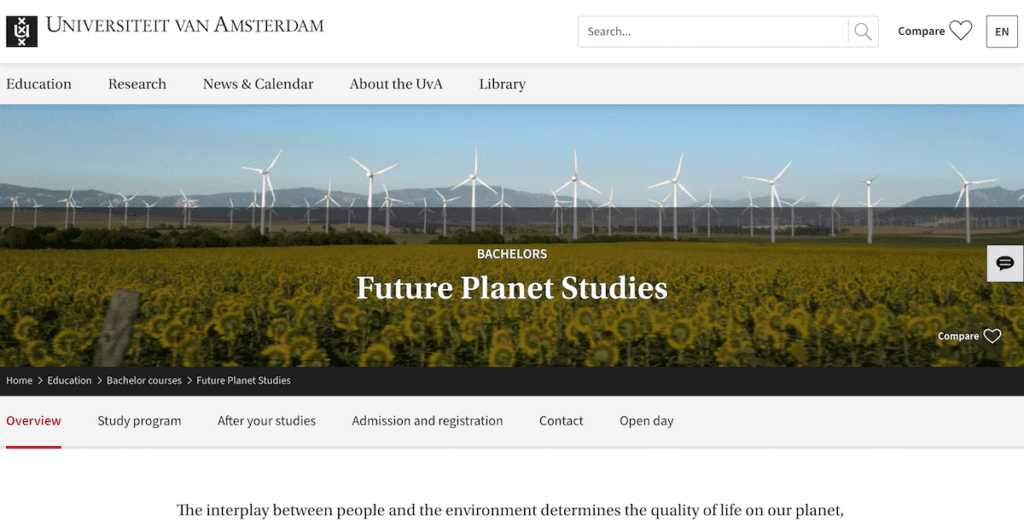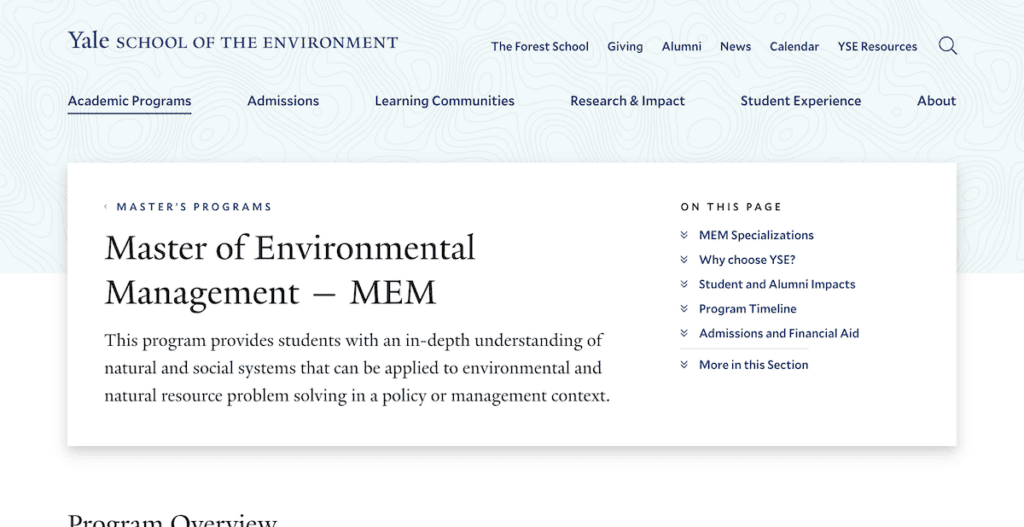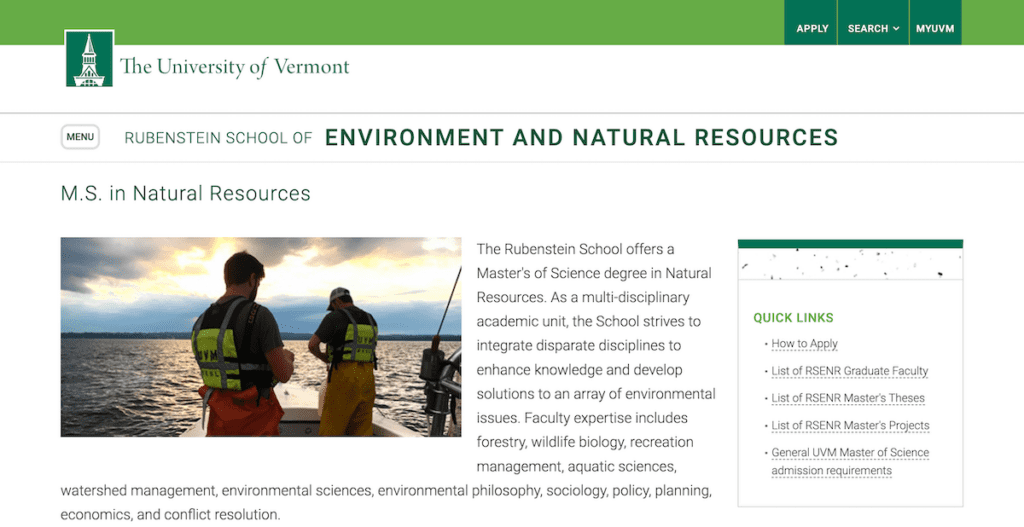In an era where climate change and environmental degradation have become pressing global concerns, the need for sustainable practices and solutions has never been more urgent.
The pursuit of a sustainable future rests upon the shoulders of individuals equipped with the knowledge and skills to drive transformative change.
Enter sustainability degrees—a growing field of study that empowers individuals to become catalysts for positive environmental, social, and economic impact.
Below, we will explore the power of sustainability degrees, shedding light on their significance, key areas of focus, and the opportunities they offer to create a better world for generations to come.
- The Importance of Sustainability Degrees
- Areas of Focus in Sustainability Degrees
- Opportunities for Graduates
- Undergraduate Sustainability Degrees
- Graduate Sustainability Degrees
The Importance of Sustainability Degrees
Sustainability degrees play a pivotal role in addressing the complex challenges we face as a global community. These interdisciplinary programs equip students with a comprehensive understanding of environmental science, resource management, social equity, and sustainable development principles.
By blending scientific knowledge with social, economic, and policy perspectives, sustainability degrees provide a holistic approach to solving real-world problems.
One of the key benefits of sustainability degrees lies in their ability to foster critical thinking and innovation. Graduates gain the skills necessary to analyze complex systems, identify sustainable solutions, and design strategies that minimize negative environmental impacts while maximizing social and economic benefits.
This multidimensional approach ensures that graduates are well-prepared to address the intricate and interconnected challenges of sustainability in various sectors, including business, government, nonprofits, and academia.
Areas of Focus in Sustainability Degrees
Sustainability degrees offer a diverse range of specializations that align with different interests and career paths. Some common areas of focus include:
- Environmental Science and Conservation: This specialization delves into the study of ecosystems, biodiversity, climate change, and conservation strategies. Graduates may pursue careers in environmental consulting, natural resource management, or research.
- Sustainable Business and Management: This specialization explores the integration of sustainability principles into business strategies. Graduates are equipped to drive corporate sustainability initiatives, develop sustainable supply chains, and create socially responsible business models.
- Renewable Energy and Energy Efficiency: With a focus on clean energy technologies and resource efficiency, this specialization prepares graduates to tackle the pressing challenges of transitioning to renewable energy sources. Careers in renewable energy project management, policy advocacy, or energy auditing are common.
- Sustainable Urban Planning and Design: This specialization examines how cities can be designed and managed to promote sustainability, resilience, and livability. Graduates may contribute to urban planning, sustainable transportation, or green infrastructure development.
- Social and Environmental Justice: This specialization explores the intersection of sustainability and social equity, addressing issues such as environmental racism, fair trade, and community empowerment. Graduates may work in community development, advocacy, or policy analysis.
Opportunities for Graduates
Sustainability degrees open doors to a wide array of career opportunities in both the public and private sectors. As sustainability becomes a mainstream concern, organizations across industries are actively seeking professionals with the knowledge and expertise to guide their sustainability strategies.
Graduates can find employment in sustainability consulting firms, government agencies, environmental nonprofits, corporate sustainability departments, and research institutions.
They can contribute to policy development, environmental impact assessment, sustainable supply chain management, green building design, climate change mitigation, and more.
Furthermore, sustainability degrees provide a solid foundation for entrepreneurship and innovation. Graduates have the potential to create their own startups or join existing ventures focused on sustainable technologies, circular economy solutions, renewable energy, and socially responsible business models.
Undergraduate Sustainability Degrees
University of Colorado Boulder – Bachelor of Arts in Environmental Studies
The Environmental Studies undergraduate major focuses on training students in various aspects of environmental change. The program integrates scientific knowledge of human-environment interactions, practical approaches to environmental problems, and the values that influence our decisions and actions.
Upon completion of the Bachelor of Arts in Environmental Studies, graduates will be able to:
- Apply scientific principles of earth systems and human-environment interactions to understand and address environmental problems and potential solutions.
- Critically evaluate different sources, claims, and data related to environmental topics and construct their own well-supported arguments.
- Conduct independent research and produce a comprehensive analysis of an environmental issue.
- Assess diverse perspectives and values regarding environmental issues.
- Communicate effectively about environmental topics through written and oral formats.
- Analyze how historical and contemporary systems of exploitation, oppression, inequality, and unequal power relations shape global and local environmental burdens and benefits.
University of Amsterdam(Netherlands) – Bachelor of Science in Future Planet Studies

This Bachelor’s program recognizes the interconnectedness between people and the environment and aims to address the challenges of sustainability. It emphasizes the need for specialists who can integrate knowledge from various disciplines to find sustainable solutions.
The curriculum combines perspectives from earth sciences, biology, social sciences, and economics to understand human impact on the planet.
The program offers two specializations: Future Earth (natural sciences) and Future Society (social sciences), allowing students to choose their area of focus. Each semester revolves around a sustainability-related theme, such as climate and energy, quality of life, and food and water.
The program gradually transitions to English-medium instruction from the second year, with support provided in the first year. In the third year, students have the flexibility to choose courses and have opportunities for international experiences.
University of British Columbia(Canada) – Bachelor of Science in Natural Resources – Forestry and Agriculture Bioeconomy Sciences and Technology
The Bioeconomy Sciences and Technology program offered by UBC Forestry in Canada is designed to capitalize on the country’s strengths in forestry, agriculture, biomass availability, and skilled workforce.
It is the first of its kind in the country, providing a holistic education that covers the scientific, economic, and policy aspects of the bioeconomy.
The bioeconomy involves utilizing renewable biological resources like wood, plants, and organic waste to create valuable products such as biofuels, bioplastics, and medicine.
By enrolling in this program, students will gain a comprehensive understanding of the bioeconomy and develop the necessary skills to contribute to the innovative development of renewable materials, energy, and sustainable land-use strategies, paving the way for a sustainable future.
University of Washington – Bachelor of Science Degree in Environmental Science and Terrestrial Resource Management: Sustainable Forest Management
The School of Environmental and Forest Sciences focuses on generating and sharing knowledge to support the responsible management of natural and managed environments and the sustainable utilization of their resources.
The school aims to be a global leader in addressing environmental and natural resource issues. It adopts an integrated, interdisciplinary approach across various scales, ranging from urban to wildland areas, to ensure the sustainability and functionality of complex natural resource and environmental systems.
The programs offered by the school prepare students to contribute to discussions and solutions related to resource challenges at local and global levels.
Graduates gain the necessary expertise to assess natural resources, understand forest ecology, manage environmental services, handle forest fuels, achieve sustainable harvesting, market forest products, and navigate the social, economic, and ecological factors impacting forest management and resources.
University of Edinburgh – BSc Ecological and Environmental Sciences
Ecological and Environmental Science is a field that encompasses the study of how organisms interact with their surroundings, including the physical, chemical, and biological aspects. It is a vital discipline for understanding and managing changing environments to ensure a more sustainable future.
This program focuses on data-driven innovation and computational analysis, which are in high demand across various employment sectors.
Students will gain skills in understanding environmental issues, designing strategies for sample collection, making ecological and environmental measurements, analyzing data using modern statistical methods and measuring progress and efficiency of conservation and environmental management plans.
The program benefits from an extensive network of experts who contribute to the teaching, providing valuable real-world experience and networking opportunities for students.
The faculty consists of world-renowned geographers, Earth and environmental scientists who incorporate their latest research into the curriculum, covering diverse areas from the tropics to the poles.
By joining this program, students will have the opportunity to tackle today’s greatest challenges in ecological and environmental science. The university ranks 15th in the world and is among the top 50 universities globally for natural sciences, environmental sciences, Earth, and marine sciences.
The program is supported by a dedicated Careers Service and is connected to the Center for Sustainable Forests and Landscapes, enhancing the learning experience and potential employment prospects for students.
University of Leeds (United Kingdom) Bachelor of Science in Environmental Science
The Environmental Science degree program is designed to address global challenges related to the environment, ranging from species conservation and climate change to renewable technologies and sustainable development.
The program provides a comprehensive understanding of the Earth’s environmental systems, incorporating principles from physics, chemistry, and biology. It aims to equip students with the necessary knowledge and tools to identify and address key environmental issues faced by humanity.
The program offers interdisciplinary perspectives by drawing on a wide range of expertise, enabling students to gain insights into real-world environmental problems.
Practical skills, including fieldwork and laboratory techniques, data collection, and analysis, are integral parts of the curriculum. The teaching staff consists of experienced practitioners, providing students with valuable insights and guidance.
Throughout the program, students have the opportunity to engage in frontier science through an independent research project in their final year. This hands-on experience allows them to apply their knowledge and develop critical research skills.
Graduates of the Environmental Science program possess a deep understanding of environmental issues and valuable transferable skills. They are well-positioned for employment opportunities or further education at the postgraduate level, equipped with both specialized knowledge and broader environmental skills.
University of California, Santa Barbara – Environmental Studies, B.A.
The B.A. in Environmental Studies is an interdisciplinary program that equips students with the skills to address social, cultural, and scientific challenges related to environmental issues.
Students begin with lower division courses that promote integrated thinking across natural sciences, social sciences, and humanities. They then build disciplinary expertise through prerequisite courses.
In the upper division, students focus on integration and interdisciplinarity by selecting one course from each of the three clusters: Ecology and Society, Energy/Water/Climate, and The Built Environment. These courses explore key environmental topics and encourage critical thinking and solutions-based approaches.
To further specialize, students choose upper division Environmental Studies electives and complete an outside concentration. The outside concentration allows students to take courses from other UCSB departments or programs that align with their interests.
Many students use this opportunity to pursue a double major, minor, or participate in field studies or study abroad programs.
The B.A. in Environmental Studies offers a comprehensive curriculum that prepares students to address environmental challenges through an interdisciplinary lens. It emphasizes integrated thinking, critical analysis, and provides opportunities for specialization and experiential learning.
University of Oregon – Environmental Design Program (BA/BS)
The Environmental Design program at the University of Oregon’s College of Design offers a multidisciplinary BA/BS degree that focuses on visual and spatial design skills within the context of environmental sustainability.
The program integrates coursework from various fields such as landscape architecture, architecture, interior architecture, planning, public policy, art, product design, and historic preservation.
By combining these disciplines, students gain a unique skill set that prepares them for diverse careers in government agencies, environmental nonprofits, ecological restoration, sustainable development, and more.
The program addresses the growing demand for creative, cross-disciplinary approaches to address pressing environmental challenges.
University of Texas at Austin – BA Sustainability Studies
The College of Liberal Arts presents the Bachelor of Arts in Sustainability Studies degree program, meticulously designed to offer a comprehensive and focused exploration of sustainability methodologies and subject matter.
The program is situated within the Department of Geography and the Environment, providing students the opportunity to enroll in courses offered by the Moody School, School of Architecture, Jackson School of Geoscience, and more.
The Sustainability Studies curriculum, in addition to meeting university and college requirements, incorporates a diverse range of disciplines such as social science, earth science, economics, communications, and policy.
Students have the flexibility to select one of three thematic concentrations: Trajectories to Sustainability, Sustainable Choices in a Diverse World, or Natural Resource Management.
This allows them to tailor their degree plan to align with their specific interests and aspirations.
To complement their coursework, students are required to fulfill a capstone requirement and engage in an internship, which are facilitated through two designated courses.
This hands-on experience enhances their understanding and application of sustainability principles.
By pursuing the Bachelor of Arts in Sustainability Studies, students gain a well-rounded education that equips them with the necessary skills and knowledge to contribute meaningfully to the field of sustainability.
London School of Economics. – BSc Environment and Sustainable Development
The BSc Environment and Sustainable Development program offers an engaging exploration of real-world challenges and potential solutions. Led by esteemed international experts, the program provides research-informed teaching, enabling you to delve into key debates surrounding environment and development.
You will analyze the drivers and politics of sustainable and unsustainable development while gaining a critical understanding of environmental change in relation to human well-being and development.
The program also equips you with essential skills for policy-making and analysis in the field of environment and development.
Throughout the program, you have the flexibility to select from a variety of options, including an international field-course, allowing you to tailor your studies to your specific areas of interest.
Virginia Tech University – Sustainable Biomaterials B.S. Degree
Sustainable Biomaterials is a field offering promising career prospects, enabling individuals to contribute to positive change. It addresses the increasing demand for eco-friendly and renewable products, utilizing natural resources like wood and other biomaterials to create innovative and sustainable solutions for the future.
The Sustainable Biomaterials major at Virginia Tech stands out as a distinctive program in the United States, focusing on the development of high-performance materials with minimal environmental impact.
Emphasizing practical experience, the major incorporates hands-on laboratories into most courses. Students are strongly encouraged to participate in internships, undergraduate research, and study abroad programs, providing valuable opportunities for professional skill development, real-world exposure, and industry connections.
Collaborations with various companies facilitate internship and employment opportunities in areas such as production management, product manufacturing, sales and business management, green building design, wood-based composites, and bio-products research.
The program’s in-house research laboratories offer students a unique chance for practical learning experiences.
An impressive 90% of Sustainable Biomaterials students secure employment before graduation, often receiving multiple job offers.
Graduates excel in diverse roles, including quality control manager, industrial operations manager, export logistics and sales, continuous improvement facilitator, business account manager, biofuel technician, industrial safety coordinator, building systems technical manager, energy management systems specialist, and environmental safety manager.
University of Wisconsin-Madison – Bachelor of Science in Environmental Sciences
The Environmental Sciences major caters to the increasing demand among aspiring undergraduate students for a comprehensive and scientifically grounded program that fosters critical thinking and prioritizes the resolution of environmental issues for the betterment of society.
This program has been thoughtfully crafted to equip graduates with the necessary skills to excel in entry-level positions within nonprofit organizations and the private sector. It also prepares them for advanced study in master’s and doctoral research programs in environmental disciplines.
Potential career paths for Environmental Sciences graduates encompass a wide range of fields, including environmental monitoring, consulting, education, research, planning, natural resource management, ecological restoration, remediation, water and air quality assessment, sustainability practices, and more.
By undertaking this major, undergraduates acquire a solid foundation in the natural sciences, covering essential subjects such as calculus, biology, chemistry, and physics. The core and elective courses are drawn from the diverse offerings of both the College of Agricultural and Life Sciences and the College of Letters & Science.
Graduate Sustainability Degrees
University of Southern California – Master of Science in Social Entrepreneurship (MSSE)

The Master of Science in Social Entrepreneurship program offered by the Marshall School of Business recognizes the need for business acumen and leadership to address complex global problems.
It prepares students to become leaders in the field of social impact by providing a business education tailored to the unique aspects of social entrepreneurship.
The program focuses on balancing financial missions with social missions, empowering students to create sustainable change.
As the first program of its kind in a U.S. business school and one of the few worldwide, the MSSE curriculum explores social enterprise, feasibility analysis, impact investing, cause-related marketing, environmental sustainability, and global social impact.
Graduates gain the business knowledge and skills necessary to make a meaningful social impact and can pursue careers in launching social enterprises or taking leadership roles in existing ones.
With a skills-based curriculum consisting of required and elective courses, students learn from esteemed faculty who are experts in their respective fields.
The program emphasizes management and leadership best practices in solving pressing social challenges. By combining business expertise with a social impact lens, students are equipped to address the world’s most critical issues.
Stanford University – Sustainability Science and Practice (MS)
The Sustainability Science and Practice (SUST) program at Stanford University’s Doerr School of Sustainability prepares leaders to drive the transition to a sustainable and just society.
With the challenges of population growth, increasing consumption demands, and disparities in wealth and opportunity, the program equips students with the knowledge, skills, and mindset needed to address urgent sustainability challenges. By combining theoretical understanding with practical applications, graduates are empowered to envision a prosperous future, design sustainable practices, and foster partnerships.
The program emphasizes complex problem-solving, systems thinking, and real-world application to secure human well-being across generations. Joining the SUST program means becoming part of a community committed to creating a sustainable future where the needs of all are met, both now and in the future.
Pontificia Comillas University of Madrid – Degree in Environmental Engineering and Sustainability

Pontificia Comillas University of Madrid, often referred to simply as Comillas, is a prestigious institution renowned for its commitment to academic excellence and values-driven education.
Established in 1890, the university holds a rich history of providing comprehensive and innovative programs that foster holistic development in its students. Situated in the heart of Madrid, Comillas University offers a vibrant learning environment that combines tradition with modernity.
In the current industrial context, all sectors need to undergo an evolution that enables the promotion of economic, social, and industrial development.
This evolution should occur within a newfound awareness of environmental respect, sustainable decision-making, and resource and energy-efficient strategies.
As a result, each company must possess a technical profile aligned with a comprehensive perspective.
This profile should encompass the capacity to formulate decisions and devise strategies that harmonize development with the new ethos of environmental responsibility and energy sustainability.
This Masters degree in Environment and Energy Transition (MEET) has been established to cater to the specific training requirements of this emerging profile sought after by companies. Its aim is to cultivate students into natural leaders within the realm of sustainable environmental and energy transition processes.
This comprehensive program is designed to enhance the skills and capabilities of participants within a one-year timeframe. Throughout their journey, students receive continuous guidance from dedicated educators and mentors.
Moreover, the program ensures students maintain consistent interaction with the corporate world. Industry professionals serve as faculty members, and the curriculum incorporates full-time internships, including international placements, to provide hands-on experience and industry exposure.
University of Oxford(United Kingdom) – MSc in Environmental Change and Management
The MSc program aims to provide a comprehensive understanding of environmental change processes and the individuals and organizations involved in environmental management.
It seeks to develop interdisciplinary and analytical environmental leaders who can make informed decisions.
The course has three main objectives:
- Explore the nature, causes, and impacts of major environmental changes on global, regional, and local scales. It examines the interplay between environmental changes and critical social and ecological systems.
- Examine the economic, legal, cultural, and ethical aspects of environmental responsibility and systemic solutions. This includes studying mitigation, adaptation, remediation, enhanced resource stewardship, and other sustainable approaches to environmental change in different contexts.
- Empower environmental leaders to address pressing environmental problems by providing them with analytical and practical skills and a broad understanding of earth systems and societies in relation to environmental change.
The course consists of three thematic areas and eight modules covering topics such as the Anthropocene, Earth systems, global change, human systems, environmental economics and policy, energy systems, sustainable responses to environmental change, and governance.
Teaching methods include lectures, seminars, workshops, and field courses to explore key issues in-depth. Elective modules offer smaller group settings for tutorial-style teaching and discussions based on contemporary research themes. The aim is to foster knowledge, critical thinking, and collaborative dialogue.
The program involves approximately ten hours of weekly teaching during term time, with additional supported learning on field trips. Students are expected to engage in self-directed learning and work on a thesis project with the guidance of a specialized supervisor.
Fieldwork and external visits to sites like coastal and marine environments, woodlands, national parks, and centers for alternative technology are an integral part of the program.
Yale University – Master of Environmental Management

This program offers students a comprehensive knowledge of natural and social systems, which can be effectively utilized to address environmental and natural resource challenges within the realms of policy and management.
The Master of Environmental Management (MEM) program combines natural and social sciences to explore the relationships between science, management, and policy.
The program aims to provide students with a comprehensive understanding of natural and social systems for effective problem-solving in environmental and natural resource management.
Alongside coursework, students enhance their leadership and management skills through internships, professional development courses, and other opportunities.
The MEM curriculum allows students to specialize in a particular area while offering flexibility to explore related disciplines. This approach ensures students develop both depth and breadth in their studies.
University of Michigan – M.S. Ecosystem Science and Management – Conservation Ecology
In the Ecosystem Science and Management program, you will engage in a comprehensive study of environmental issues at various scales, from local to global. Through classes, laboratories, and fieldwork, you will explore diverse environments, including urban landscapes and wilderness areas.
The curriculum covers fundamental concepts and practical techniques such as GIS, resource management, and field sampling, which are essential for understanding ecosystems and effective environmental management.
By applying these skills, you will develop the ability to tackle complex problems and emerge as a scientist and sustainability practitioner ready to make a positive impact in the field.
ESSEC Business School (France) – MSc in Sustainability Transformation
ESSEC Business School launched the ESSEC Together initiative in 2020, demonstrating its commitment to ecological engagement.
The initiative integrates environmental challenges and ecological transitions into all programs, from Bachelor’s to Master’s levels, and implements environmentally-friendly processes across its global campuses.
Building upon this initiative, ESSEC introduced the MSc in Sustainability Transformation in 2021, aiming to prepare future leaders to make a sustainable impact in the business world.
The MSc in Sustainability Transformation equips students with the knowledge, tools, and network necessary to drive meaningful change and seize new opportunities in an increasingly volatile world.
Recognizing that sustainability is now an imperative, the program emphasizes the need for transformation across all aspects of organizations.
There is a growing demand for professionals who can effectively balance business and environmental considerations within corporations.
Combining academic and professional experiences, the program provides students with a comprehensive understanding of management principles and contemporary social and environmental issues.
Learning expeditions foster connections with corporations, entrepreneurs, NGOs, and public administrations, enabling students to gain firsthand exposure to real-world scenarios.
The program culminates in a final internship or academic thesis, allowing students to apply their acquired knowledge and skills in practical settings.
Arizona State University – Master of Science in Engineering in Sustainable Engineering
The MSE in Sustainable Engineering is a versatile graduate program designed for professionals and graduate-level students with engineering and physical science backgrounds. It offers a customizable curriculum that allows individuals to tailor their studies according to their interests and goals.
The program covers a wide range of sustainable engineering topics, including energy systems, alternative energy production, water engineering, transportation engineering, earth systems engineering, industrial ecology, life cycle assessment, environmental technologies, green construction practices, and sustainable technology systems.
Sustainable engineering goes beyond traditional engineering education by incorporating complex social, environmental, political, and economic factors into engineering theory and practice. The ultimate objective is to achieve solutions that are economically, technically, environmentally, institutionally, and socially efficient and robust. The goal of sustainable engineering is to contribute to the long-lasting improvement of the human condition.
Columbia University – Master of Science in Sustainability Management
Experience the opportunity to study alongside renowned experts in the field at the world’s leading sustainability institution, which offers an unmatched array of sustainability professionals and course selections.
The Master of Science in Sustainability Management program has been meticulously designed to cater to current and aspiring leaders who harbor ambitions of pursuing management careers at the intersection of business and the environment.
Graduates of this program possess the remarkable ability to transform organizations by devising and implementing the essential sustainability strategies required for success and triumph in the 21st century.
The curriculum seamlessly integrates the study of management principles with state-of-the-art sustainability practices and scientific knowledge. It offers both full-time and part-time options to accommodate individuals with existing professional commitments.
University of Copenhagen (Denmark) – Master of Science (MSc) in Environmental Science
The MSc program in Environmental Science is centered around promoting human and environmental well-being. This English-taught program acknowledges the significant influence of human activities on the environment, encompassing factors such as agriculture, industrial pollution, and consumption-related pollution.
By specializing in one of three academic fields – Chemistry, Toxicology and Health; Soil and Water; or Soil, Water and Biodiversity (EnvEuro) – you will acquire the knowledge and skills necessary to develop sustainable solutions to these pressing challenges.
University of Vermont – M.S. in Natural Resources

The Rubenstein School offers a Master’s of Science degree in Natural Resources, providing a comprehensive and interdisciplinary approach to address various environmental challenges.
The School integrates diverse disciplines to expand knowledge and develop effective solutions. The faculty comprises experts in forestry, wildlife biology, recreation management, aquatic sciences, watershed management, environmental sciences, environmental philosophy, sociology, policy, planning, economics, and conflict resolution.
The Rubenstein School also embraces interdisciplinary fields like conservation biology, ecological economics, and ecological design. With strong connections to conservation organizations, the program ensures a robust curriculum that fosters academic leadership in conservation.
Graduate students have the opportunity to pursue a Certificate in Ecological Economics alongside their M.S. program, further enhancing their expertise and credentials.
University of Amsterdam – Master’s in Earth Science: Environmental Management
The Master’s Programme in Earth Sciences at the University of Amsterdam is dedicated to advancing our understanding of Earth system processes and the complex interactions between humans and ecosystems. The program offers two specialized tracks to cater to different interests and career goals.
In the Earth System Science track, students delve into the processes that govern the Earth system’s functioning and explore the impact of human activities and climate change.
This knowledge is crucial for addressing global challenges and achieving sustainability objectives, while also gaining insights into landscape dynamics and ecosystem services.
Students engage in fieldwork, laboratory studies, and modeling exercises to examine landscape and climate dynamics across various spatial scales.
They can choose to specialize in computational skills like Remote Sensing, LiDAR, GIS, landscape modeling, and geostatistics, or analytical skills such as soil chemistry, microfossil analysis, or geomorphic analysis.
The track offers a balanced curriculum encompassing computational, laboratory, and field survey skills.
In the Environmental Management track, students focus on the interdisciplinary approaches required for managing natural resources, landscapes, and ecosystems.
This involves integrating Earth sciences, social sciences, and humanities to address the challenges posed by human-wildlife conflicts, urban environments, species adaptation, nature reserve revitalization, and climate crisis-related conflicts.
Students gain insights into the pressures faced by species and ecosystems in our society and understand the complexities of environmental management.
Practical application of knowledge is emphasized through a hands-on internship with a private or governmental organization, allowing students to contribute to environmental management problem-solving efforts for the benefit of society.
Both tracks of the program provide essential knowledge and skills to navigate the evolving world and contribute to sustainable practices and effective environmental management.








